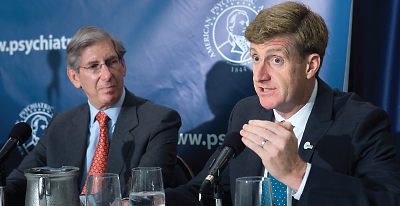On June 3, President Obama and Vice-President Biden hosted a White House conference on mental health to which several APA leaders were invited.
They included Jeffrey Lieberman, M.D., president of APA and chair of psychiatry at Columbia University; Paul Summergrad, M.D., APA president-elect and chair of psychiatry at Tufts University; and Jeffrey Borenstein, M.D., editor in chief of Psychiatric News, host of the television series “Healthy Minds,” and president and CEO of the Brain & Behavior Research Foundation. Also attending was Patrick Kennedy, a former member of Congress who cosponsored the 2008 Paul Wellstone and Pete Domenici Mental Health Parity and Addiction Equity Act in the House of Representatives and worked hard to ensure its passage. Today he serves as a senior strategic advisor for APA.
After the conference, these participants, along with APA Medical Director and CEO James H. Scully Jr., M.D., held a press conference at the National Press Club in Washington, D.C., to discuss some of the key issues in mental health care and how mental illness is perceived by the public.
One of those issues concerns the federal parity law that was passed five years ago but still does not have a final rule to ensure that insurance companies follow the law’s provisions as the law was intended. “We want a rule to be released by the White House” that says that treatment for illnesses of the brain as well as the body should be covered by insurance policies, Kennedy declared, and disclosure of the names of insurance companies that do not “comply with parity” should be part of the final rule. Summergrad concurred, emphasizing that it has been five years since the parity act was signed and that a final rule is critical.
Another critical issue is how to dissuade the American public from believing that all people who commit violence are mentally ill. “Gun control and violence have been conflated with mental illness,” Lieberman said. Yet only 4 percent of violent crimes are committed by mentally ill individuals, he emphasized.
Yet a third pressing issue is how to combat the stigma often attached to mental illness and its treatment. The speakers agreed that the best solution is to change how the media portray mental illness. An example of how reporters propagate stigma is when they write, “A politician has a schizophrenic attitude,” Borenstein noted. Reporters would certainly never write, “A politician has a diabetic attitude.” An example of how popular films foster stigma can be found in the new psychological thriller “Side Effects,” Lieberman pointed out. The film is entertaining, but it undermines the psychiatric profession by reinforcing myths that have often been promulgated about this field, he said.
The increasing integration of mental health care with primary care is also high on the national mental health agenda. Scully reported that APA is working with private insurance companies and Medicare officials to ensure that they provide equitable payment for care provided through such initiatives.
Finally, the health insurance exchanges that are being set up under the Affordable Care Act will influence how mental illness is covered. “We need a voice in these health exchanges…and APA needs to convene that discussion,” Kennedy asserted. ■
To watch a video of APA’s press conference following the White House Conference on Mental Health, go to
http://vimeo.com/67656759.

